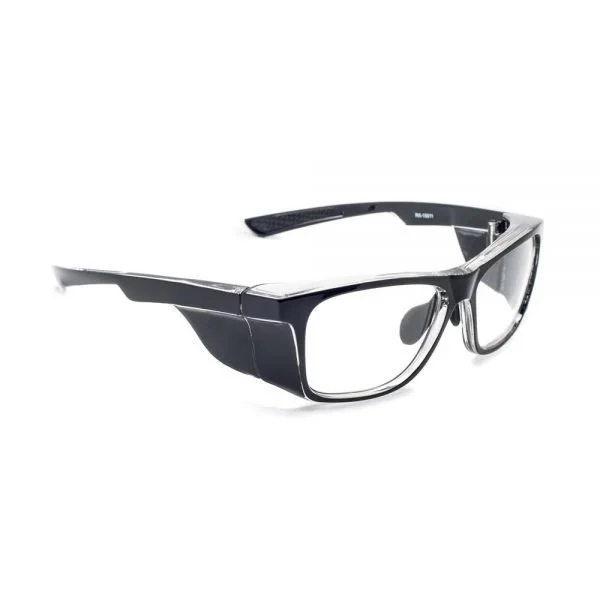Lead Glasses
Lead glasses, also known as radiation protection glasses, are essential PPE for clinicians working in environments with routine X-ray exposure, including Surgery, Cath Lab, Interventional Radiology, and Imaging.
RCS offers a wide selection of protective eyewear from trusted brands, including Burlington Medical, Techno-Aide, and INFAB, featuring both high-protection frames and stylish designs from brands clinicians already know and trust.
Our inventory includes prescription and non-prescription options with leaded glass that blocks up to 0.75mm Pb equivalency for optimal eye radiation shielding.
Whether you're sourcing personal eyewear for daily use or outfitting shared hospital supplies, our team of experts is here to guide you to the best fit for your clinical needs.
Expert Review
When selecting lead glasses, protection is non-negotiable, but so is comfort and fit, especially for clinicians who wear them for hours at a time.
Wraparound styles provide superior lateral coverage, making them a smart choice for high-radiation environments, such as the Cath Lab and Interventional Radiology. For those needing corrective lenses, prescription-ready options ensure you don’t have to sacrifice vision for safety.
Lightweight frames with adjustable nose pads and padded temples are ideal for long procedures. We often recommend models that strike a balance between durability and all-day wearability, especially for surgeons and technicians who frequently switch between tasks.
From utilitarian styles to sleek frames that resemble designer eyewear, there’s no need to compromise on appearance or performance.
Justin McKay, Co-Founder of RCS
Get a Quote
Our expert team will guide you towards the right option for your needs.
What to Consider when Purchasing a Lead Glasses
Choosing the appropriate radiation protection glasses for your staff can be overwhelming. Here’s what you need to consider.
Weight and Comfort
Weight and comfort are critical when it comes to lead glasses, if they’re not comfortable, you simply won’t wear them. The good news? Today’s styles include lightweight, ergonomic options designed for all-day wear. Our team can help you find the right fit for your face, workflow, and protection needs.
Protection Levels
You only get one set of eyes, and protecting them from radiation exposure is essential. Every facility follows its own safety protocols, typically guided by the Radiation Safety Officer. Be sure to choose lead glasses with the appropriate coverage and lead equivalency for your specific procedures and exposure risk.
Customization Options
Whether you need heavy-duty side shielding for high-exposure environments or prefer a lightweight, fashion-forward look for everyday use, you don’t have to choose between protection and comfort. Many models now offer prescription lenses, anti-fog and anti-scratch coatings, and customizable fits.
Why RCS?
Brand Agnostic: Invest in the right equipment for your needs with various options available from our four partner Radiation Protective Equipment (RPE) manufacturers.
Lead garments arrive ready to use: RCS will X-ray scan, tag, and inventory your garments in RADCOMPLY™ before shipping.
Dedicated RPE Team: We strive to provide the best customer service by offering sizing and fitting assistance and preferred turnaround times.
We Don’t Just Sell Gear — We Take Care of It
We get it - lead apron management is at the bottom of your to-do list. We’re here to help. RCS is the only provider offering end-to-end X-ray garment care, including:
We’re Ready to Help You!
-
Radiation protection glasses, often called lead glasses, are protective eyewear that clinicians use to shield against scatter radiation while operating near equipment like X-rays, C-arms, or fluoroscopy. Unlike basic safety glasses, these specialized frames can be fitted with prescription lenses, single vision, multifocal lenses, or even progressive lenses. Many models feature durable polycarbonate lenses or ultra thin high index lenses that remain lightweight yet impact resistant for busy clinical environments.
Most X-ray glasses are made of lead glass or lead-lined materials in the lenses, while the frames are made of durable nylon or plastic.
The lead glass in the lenses provides crucial protection to clinicians during high-dose procedures. A review published in 2020 stressed that the eyes are highly sensitive to radiation. Ongoing exposure in radiology or interventional surgery can lead to several adverse health outcomes, including:
Cataracts
Optic neuropathy
Glaucoma
Retinopathy
Radiation cataracts, a specific form of cataract caused by prolonged exposure, have been identified as a significant risk for clinicians working in radiology.
OSHA recommends a maximum occupational radiation dose of 1.25 rem (12.5 mSv) per quarter to the whole body, including the lens of the eyes, to prevent health risks associated with exposure. Wearing lead glasses during procedures where the eyes are heavily exposed significantly reduces radiation doses to keep medical staff members below the recommended limit.
-
It’s common to wonder, “Do X-ray glasses really work?” when determining the appropriate personal protective equipment (PPE) to wear for procedures. Leaded glasses do effectively shield radiation.
A study in the Journal of Interventional Radiology stated that lead glasses with a 0.5 mm lead equivalence or higher can significantly reduce the radiation dose clinicians receive while conducting X-rays. The biggest reduction in the dose was noted for X-ray beams in the same horizontal plane of the eyes.
The study also mentioned that X-ray glasses' effectiveness rates can be even higher with certain modifications. Those included:
Built-in side shields or wrap-around styles to increase coverage to the sides of the face
Larger vertical sizes to shield scatter radiation coming from directly below the physician
A reduced gap between the glasses and the face to improve protection from all angles
Radiation protective eyewear, such as wraparound designs, plays a critical role in mitigating occupational exposure during procedures.
Different manufacturers will offer lead glasses in varying designs and shapes. It’s best to consult your facility’s radiation safety officer to determine the best design for medical staff members during procedures.
-
Radiation protection glasses work. They provide significant benefits over not wearing glasses during procedures where the eyes are heavily exposed to radiation.
A study from Spine assessed the performance of different types of glasses with 0.75 mm lead equivalence during minimally invasive spine surgery using C-arm-guided fluoroscopy. The three types of glasses evaluated were:
Traditional lead glasses without side shields
Lead glasses with side shields
Wraparound lead glasses
The study showed that each type of lead glasses performed at high effectiveness rates and provided substantially better protection than operating with no glasses. Lead safety glasses have consistently shown high efficacy in reducing radiation doses during fluoroscopy-guided interventions.Radiation protection rates did vary depending on the angle of the head for each type of glasses, so it’s best to consult with your facility’s radiation safety officer to determine the right style of protective glasses for each procedure.
-
A study from Physica Medica found that 0.75 mm lead glasses could reduce the radiation dose to the eyes by 1.6 times.
Researchers emphasized the importance of wearing protective eyewear during procedures where the eyes are in line with radiation beams. Their findings showed that not wearing PPE could cause clinicians to exceed the 20 mSv annual occupational dose limit set by the International Commission on Radiological Protection (ICRP).
As an alternative, the research from Physica Medica mentioned that a full lead visor had even better radiation-blocking capabilities from all angles. The full lead visor reduced radiation doses to the eyes by 4.5 times in clinical trials.
However, the study noted that some physicians may still opt for glasses instead because they find them more comfortable, or the full visor could get in the way during certain procedures.
-
Radiation eyewear costs can vary quite a bit depending on several factors. Common factors that influence the X-ray glasses price are:
Lead equivalence: Thicker lead glasses will usually cost more. However, a higher lead equivalence tends to provide greater levels of protection, so it’s worth investing in the thickness you need.
Modifications: Adding lead side shields often increases the price of protective glasses, but it can be worth providing extra protection to the sides of the head. Additionally, customizing frame colors or adding engravings can increase costs.
Brand: Glasses from higher-end or well-known brands often cost more. For example, Ray-Ban, Oakley, and Nike lead glasses are usually more expensive.
Prescription needed: Adding a lens prescription can increase lead glasses pricing, but it’s essential for clinicians to be able to see well while operating. Some manufacturers may also offer designs that fit over prescription glasses to help offset that cost, and a study in 2024 showed that fitover designs are effective in clinical trials.
To give you some example price ranges, 0.5mm lead glasses from Burlington Medical range between $250 to $350 on average. However, brands like Ray-Ban and Oakley tend to cost $350+.
Alternatively, the average pair of 0.5-0.75 mm lead glasses from Techno-Aide costs $150 to $250. However, Nike lead glasses from Techno-Aide usually cost more than $250.
-
Regular maintenance is required to care for lead glasses and keep them as effective as possible. Maintenance should include proper storage, regular cleaning, and annual inspections.
Storage
Storage is crucial to keep lead glasses in good condition and extend their lifespan. The best option is to store them in protective cases when not in use. The case will look similar to what you’d use for regular prescription eyeglasses. However, lead glasses can be bulkier, so ensure the case is big enough to accommodate their size. Some manufacturers will sell lead glasses with a case, or you can buy them separately.
Some other storage tips are:
Don’t store them in direct sunlight
Don’t store them in places with high humidity
Don’t store them in areas where there are frequent or extreme temperature changes
Cleaning
An effective daily cleaning method for lead glasses is to use a disposable sanitizing microfiber cloth. Ensure that the wipes you use don’t streak or leave excessive lint behind. Techno-Aide mentions that each type of lens has specific cleaning instructions:
Standard Uncoated Lenses: Clean using anti-bacterial detergent or hand soap that does not contain microbeads or abrasive grit. Gently rub the lenses in straight lines under clear running water. Dry with a soft, lint-free cloth. Commercially available alcohol-based lens wipes are also acceptable for cleaning.
Fog-Free Coated Lenses: Always clean with a 75–80% alcohol solution. Alcohol-based lens wipes are acceptable. Using light pressure, wipe in straight lines to thoroughly clean all lens and frame surfaces. Dry with a microfiber cleaning cloth. Over time, the fog-free coating should be reapplied and rejuvenated.
Anti-Reflective Coated Lenses: Clean with anti-bacterial detergent or hand soap that contains no microbeads or abrasive grit. Gently rub the lenses in straight lines under clear running water. Dry with a soft, lint-free cloth.
AORN also recommends quarterly deep cleaning for all high-touch objects in medical settings. We can assist with deep cleaning and disinfection of protective garments at RCS using EPA-approved cleaning products and processes that align with the CDC’s guidelines for removing tough bioburden.
Inspection
Techno-Aide recommends inspecting lead glasses annually to identify damage that could reduce their effectiveness. Radiographic inspections are the most accurate way to identify small damage in PPE, like lead glasses or aprons, before it gets out of hand.
Additionally, your team can conduct regular visual inspections in between annual inspections, looking for any noticeable:
Pitting
Chips
Scratches
Cracks
Broken hinges or frames
For questions about radiation protection eyewear, product selection, pricing, or maintenance, contact Radiological Care Services today. Our knowledgeable team can help you choose the right X-ray glasses for your clinical needs, ensure brand compliance with safety standards, and assist with proper care, cleaning, and inspection protocols to keep your protective gear in top condition.





